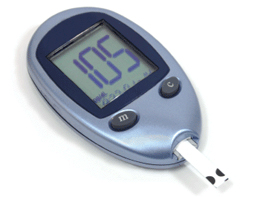Get Educated about Diabetes This Month
 Are you or someone you know affected by diabetes? Diabetes is of growing concern in this country, and across the world. It is currently affecting over 30 million Americans and that number continues to climb at an alarming rate. However, Diabetes is preventable with diet and exercise.
Are you or someone you know affected by diabetes? Diabetes is of growing concern in this country, and across the world. It is currently affecting over 30 million Americans and that number continues to climb at an alarming rate. However, Diabetes is preventable with diet and exercise.
November is National Diabetes Awareness Month and this week is National Diabetes Education Week. You can use this month to learn more about Diabetes and how you can reduce your risk for the disease!
All About Diabetes
Diabetes is a disorder where you have an increase of glucose, or sugar, in your blood. It does not discriminate- it can affect anyone, child or adult, male or female. The most common types of diabetes are type 1, type 2 and gestational diabetes.
Type 1 diabetes is a condition where the pancreas makes little to no insulin. This can be caused by genetics and other unknown factors. Type 1 diabetes affects ~5% of people who have diabetes and is usually diagnosed in children and young adults.
Insulin is a hormone made by the beta cells of your pancreas that helps regulate your blood glucose levels. If your body does not make it, you may develop high blood glucose, or hyperglycemia, because the glucose cannot get into the cells and therefore stays in the blood. This condition can cause long-term complications if left untreated.
Type 2 diabetes is a condition where your body improperly uses insulin or builds insulin resistance. This is caused by genetics and lifestyle factors. The pancreas pumps out more insulin to compensate for insulin resistance. If this process occurs over time, your pancreas will get worn out and eventually won’t make enough insulin. This will leave glucose in the blood instead of moving it into cells. About 90-95% of people who have diabetes have type 2.
Type 2 diabetes is preventable and the risk factors include: being overweight, 45 years of age and older, having a parent or sibling with diabetes and being physically inactive.
Gestational diabetes is exclusive to pregnant woman. Most women are given a glucose screening test between 24 and 28 weeks to check for it. It is identified when a woman has higher than normal blood glucose levels, but has never had diabetes before.
Signs and Symptoms
Knowing the signs and symptoms of diabetes is vital and can help prevent some of the more serious side effects associated with diabetes.
- Increased thirst
- Frequent urination
- Cuts or sores that take longer than normal to heal
- Swelling of the extremities
- Irritability and mood swings
It is important to get blood work done if you are experiencing any of these symptoms, or have a family history of diabetes. Typically, can often develop type 2 diabetes because of certain dietary practices and obesity. Going to the doctor regularly can be a great screening tool to ensure that you do not develop type 2 diabetes. Blood work will test for fasting glucose levels and A1C levels, and can be done by your regular physician.
Preventing Diabetes
Prevention may be more difficult for some with a genetic predisposition, but the following practices can be done to assist anyone and everyone, and will not only help prevent diabetes, but will aid in leading a healthier life!
- Increase your daily physical activity. This can be as simple as taking a 30-minute walk each day after dinner.
- Choose whole grain sources high in fiber whenever possible.
- Eat plenty of colorful fruits and vegetables and be sure to include them with each meal.
- Enjoy sweets in moderation to help keep your blood sugar levels in check.
Everyone has a role to play in the fight against diabetes. Whether you are personally affected by it, or may know of someone who is, taking action today can help change someone’s life for the better.
Your turn to take action: How will you work on preventing diabetes, whether for yourself or a loved one? Let me know in the comments below!

Leave a Reply
Want to join the discussion?Feel free to contribute!